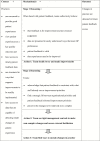Exploring the impact and use of patients' feedback about their care experiences in general practice settings-a realist synthesis
- PMID: 28985368
- PMCID: PMC6191909
- DOI: 10.1093/fampra/cmx067
Exploring the impact and use of patients' feedback about their care experiences in general practice settings-a realist synthesis
Abstract
Background: Policy encourages health care providers to listen and respond to feedback from patients, expecting that it will enhance care experiences. Enhancement of patients' experiences may not yet be a reality, particularly in primary health care settings.
Objective: To identify the issues that influence the use and impact of feedback in this context.
Design and setting: A realist synthesis of studies of the use of patient feedback within primary health care settings.
Methods: Structured review of published studies between 1971 and January 2015.
Results: Eighteen studies were reported in 20 papers. Eleven studies reported patient survey scores as a primary outcome. There is little evidence that formal patient feedback led to enhanced experiences. The likelihood of patient feedback to health care staff stimulating improvements in future patients' experiences appears to be influenced predominantly by staff perceptions of the purpose of such feedback; the validity and type of data that is collected; and where, when and how it is presented to primary health care teams or practitioners and teams' capacity to change.
Conclusions: There is limited research into how patient feedback has been used in primary health care practices or its usefulness as a stimulant to improve health care experience. Using a realist synthesis approach, we have identified a number of contextual and intervention-related factors that appear to influence the likelihood that practitioners will listen to, act on and achieve improvements in patient experience. Consideration of these may support research and improvement work in this area.
Keywords: Access and evaluation; health care; health care quality; patient advocacy; patient satisfaction; quality assurance; quality of health care; total quality management.
© The Author 2017. Published by Oxford University Press.
Figures
References
-
- Marshall MN, Romano PS, Davies HT. How do we maximize the impact of the public reporting of quality of care?Int J Qual Health Care 2004; 16 (suppl 1): i57–63. - PubMed
-
- The Scottish Government. Implementing the quality strategy for NHSScotland in primary care. In: DoH (ed). Edinburgh, UK, 2010. http://www.gov.scot/Resource/Doc/321597/0103382.pdf (accessed on 11 July 2017).
-
- Darzi A. High Quality Care for All: NHS Next Stage Review Final Report. London, UK: DoH, 2008.
-
- NHS Scotland. Partnerships for Care: Scotland’s Health White Paper. 2003. http://www.gov.scot/Resource/Doc/47032/0013897.pdf (accessed on 23 June 2017).
-
- The Scottish Government. Better Health, Better Care: Action Plan. 2007. http://1nj5ms2lli5hdggbe3mm7ms5.wpengine.netdna-cdn.com/files/2010/03/pn... (accessed on 11 July 2017).
Publication types
MeSH terms
Grants and funding
LinkOut - more resources
Full Text Sources
Other Literature Sources





